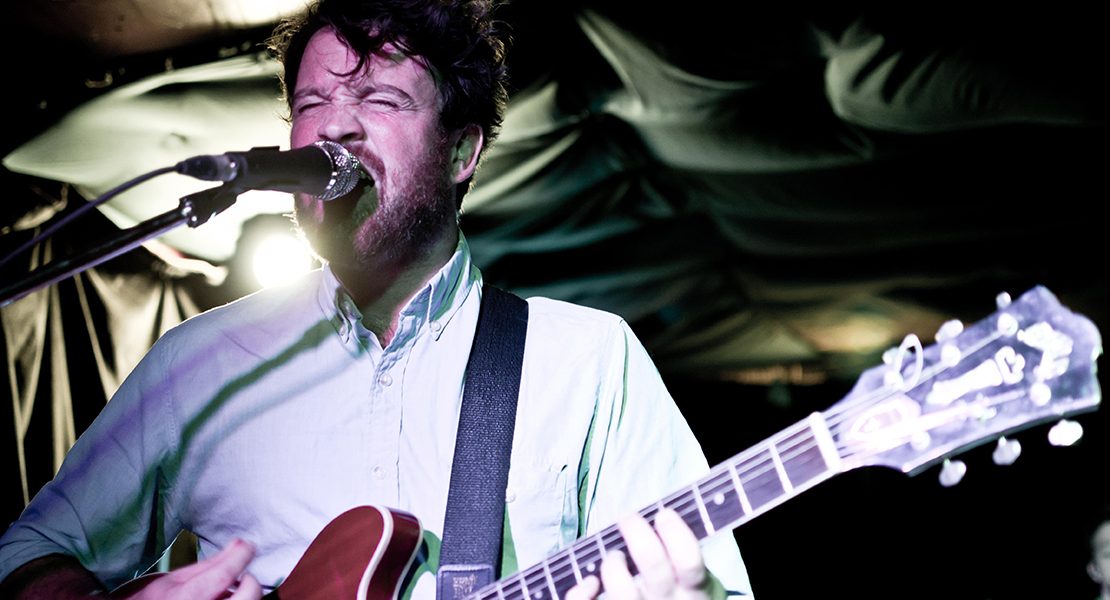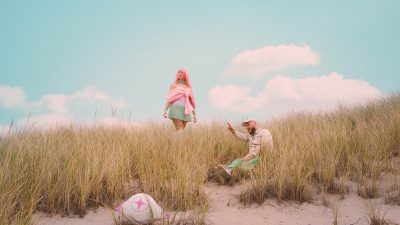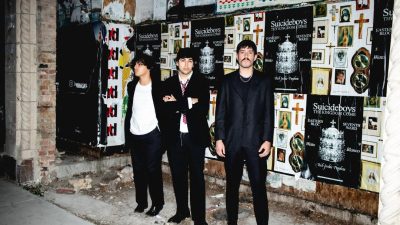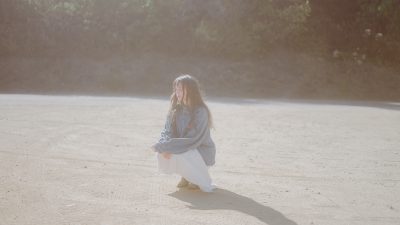Putting in the work with the Mercies

text: Michael Raine | photography: Marcin Barciak
Empty bars, cramped stages, distracted audiences, poor sound systems; it’s all part of life on tour when you’re in a young band. But playing in a Detroit “art space” surrounded by photos of naked people? “Definitely the weirdest show of the tour” says Sammy Dent with a laugh, discussing the previous night’s tour stop as he climbs the steps to the bar where Dent and the other two members of Mercies will be playing in a few hours. Luckily for them, one gets the feeling this three-piece Connecticut band won’t be playing empty bars and nude art studios for too much longer.
Formed by guitarist, singer, and songwriter Josh Rheault and drummer Dent, both formally of indie band The Deer Hunter, Mercies have been steadily winning fans and critics over with their soulful blend of rock and roll, folk, and a touch of psychedelia. Their debut LP, Three Thousand Days, received universal praise from bloggers and critics upon its release nearly a year ago. Born out of discontent with his previous band, Mercies may seem relatively new, but have actually been in the works in Rheault’s head for many years.
“Me and Sam always had a strong connection, he played drums and I played bass in that band, and we would always talk about doing a project somewhere down the road that was way different than Deer Hunter,” explains Rheault, adding that they met in the band in 2006. “When the time came, it wasn’t until 2010, I left the band and had all these demos.”
When Rheault discusses Mercies’ formation, his slight pauses and sly smiles while mentioning The Deer Hunter give the unmistakable impression that he was more than happy to leave his old band behind, even if he is trying to be polite about it. “I’ll be kind of nice here,” Rheault says laughing, hinting there is more to the story than he about to let on. “Aside from very different musical influences and direction and everything, really, I just wanted to focus on something I was very passionate about. Just from the standpoint of song writing and the way that everything was recorded, Deer Hunter was a very polished, to-grid kind of band and I just wanted to get as far away from that as a possible.”
“Deer Hunter was intense, lots of tracks, lots of instruments, and we were living in LA. [With Mercies] I was just stripping everything down, not only with music but with my life, and just taking a more minimalistic approach to things.” If a polished recording style was something Rheault wanted to avoid with Mercies, he certainly accomplished that. Returning to his native Connecticut, Rheault and Dent began jamming in an old barn behind Rheault’s parents’ house in Tobacco Valley.
That barn, now referred to as “The Barn” in Mercies lore, became the physical embodiment of the band’s DIY style. “I had never really thought of this barn as anything. It is just behind my parents’ house and it used to just store junk,” says Rheault, adding with a laugh. “It captures the sound we were trying to create anyway and it just started like that and we just thought, ‘Hey, we should turn this into a studio and live here and never leave.”

Through the winter Rheault and Dent began piecing together a band, album, and studio. “When we tracked drums there was no heat, there was no insulation, there was dirt floor in half of it,” recalls Rheault. But, amazingly, the unpolished surroundings made Three Thousand Days into an audio feast. “The electrician that wired the barn left a bunch of crap, a bunch of wire and caps,” says Rheault, “There was a big jug that we used for percussion and my brother dropped nails on the ground one time and we were like, ‘Oh, we should use that.’ Actually miked up the ground and dropped nails.”
“There’s lots of sound mixed in with the backbeat of the snare drum, all these other things that don’t really make any sense but they come together to make a unique sound that I think is really big,” says Dent, adding with a grin, “It’s the magic of The Barn.”
That magic produced an album rich with texture, harmonies, and emotion. The group wear their influences on their sleeve, not shying away from the debt owed to the music they grew up on. “I don’t want to compare my song writing to The Beatles and The Beach Boys but we do love how those recording sound and the simplicity of the recording and the instrumentation and the focus on vocals and harmonies,” says Rheault.
Adding to that classic sound, Dent and bassist Jordan Flower – who joined the group as they completed Three Thousand Days – each have their own influences. Dent comes from a jazz oriented background while Flower studied bass in college, playing a lot of jazz and classical. It’s this combination of influences that allowed Mercies to find their own sound rather than being a rehash of past folk rock groups like The Byrds.
“What we try to do is take what we like about that period or genre, not even on purpose, it’s just what comes through, and use those elements to create music that is still current. We’re not a period band. I think that’s attractive to people right now,” says Rheault.
It certainly is attractive to people. In fact, folk-based music is more popular right now than at any time since the ‘60s. Mumford and Sons’ stomp-along anthems are selling out arenas worldwide, while bands like Fleet Foxes, Bon Iver, and Grizzly Bear – groups that the guys in Mercies praise repeatedly throughout the interview – are winning Grammys and gracing magazine covers.
“I think there’s a good balance between what’s hip and cool at the moment – what’s the latest out of Williamsburg, Brooklyn, what’s the latest trend, what are all the cool bands doing – there’s a fine balance between going down the trendy route and being another Vampire Weekend rip-off and actually doing something that’s classic and timeless and you know is going to last,” says Flower. “I think there’s a fine balance to figure out what’s cool at the moment but at the same time focusing on what’s going to last. I think these guys do a fine job of maintaining that balance.”
They have maintained that balance, but there is still a long way to go before Mercies’ reaches the heights seen by Bon Iver et al. Luckily, they are more than willing to put in the work, hipster cred be damned.

“There’s so many stigmas amongst mostly young kids,” says Flower. “Young kids think they got it all figured out and we’re all in our late-20s and these young bands coming out of college think it’s not cool to do Kickstarter anymore and it’s not cool to have Indiegogo and try to raise money for your band. It’s not cool to tour, not cool to book a full tour, only play local shows. There’s all these stigmas, like, ‘That’s the way you do it and then Pitchfork will find out about you.’”
You can hear some frustration in Flower’s voice as he talks about the ever growing list of rules that govern the indie music community. “It’s just not the way it works,” he adds. “I know you think you’re cool but you got to work, you got to tour, you got to beg people for money some times. It sucks but it’s the way it is. It’s not about what’s trendy or cool, it’s about being successful and making what you’re doing worthwhile. Otherwise, you look back in five years and think ‘why did I waste my time in a band if I didn’t really mean it.’”
Rheault, Dent, and Flower are not wasting any time. With Three Thousand Days only a year old, they’ve already released another EP, The Ballet, which was a joint project with the Charlottesville Ballet out of Virginia. It signals the wider music scope that the band wants to take. Dent, who studied composing in school, has worked with ballet companies in the past and the band has agreed to provide the score for a film that is currently in production. As well, Rheault spends some of his free time painting in The Barn and provides the artwork for Mercies’ releases.
The Barn – which Rheault commonly refers to as the “base for all things Mercies – is completed and Rheault, Dent, and Flower are preparing for another cold winter of recording.
With 15 demos in the can, they have the basis for their next album. But in the meantime, they’re open to any opportunity that presents itself. “If someone comes along and says, ‘Hey, here’s what we can offer you’ then we’ll entertain it,” says Rheault. “If someone comes up to us and says ‘Hey, want to write a ballet?’ then we’ll do it. It’s kind of anything goes.”
And that’s the way it should be. After all, why waste your time if you didn’t really mean it?













